It’s common for individuals to struggle in distinguishing a failing torque converter and a damaged transmission as they are quite similar. However, armed with the right knowledge, differentiating the two is indeed possible.
Some symptoms are unique to the faulty torque converter such as slipping between gears, loss of acceleration, while a bad transmission normally has common signs like weird smell, filthy fluid. The sooner you identify the damaged component, the more appropriate actions you can take.
I will highlight different symptoms and causes of a bad torque converter and transmission. Let’s dive in!
Torque Converter And Transmission: What Are They?
Torque converter and transmission are two closely-related automotive parts, which can confuse new car drivers or car owners. Before getting to the main topic, shall we take a second to define two of them!
What Is A Torque Converter?
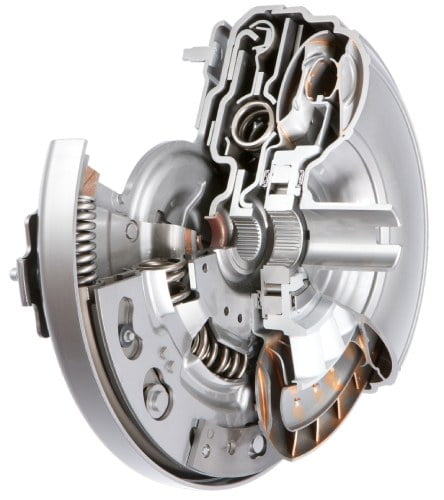
A torque converter is a form of liquid coupling that allows power transmission from the prime mover of a rotating engine to the transmission system. You will find this component only in vehicles with automatic transmissions and does what a clutch does in manual transmission vehicles.
A torque converter transfers power to the transmission without stalling the engine. It allows seamless gear changing. So, the transmission system can spin independently of the engine’s RPM. In manual vehicles, you would press the clutch pedal to the floor to separate the engine and transmission. That happens automatically in an automatic car, thanks to the torque converter.
What Is A Transmission?
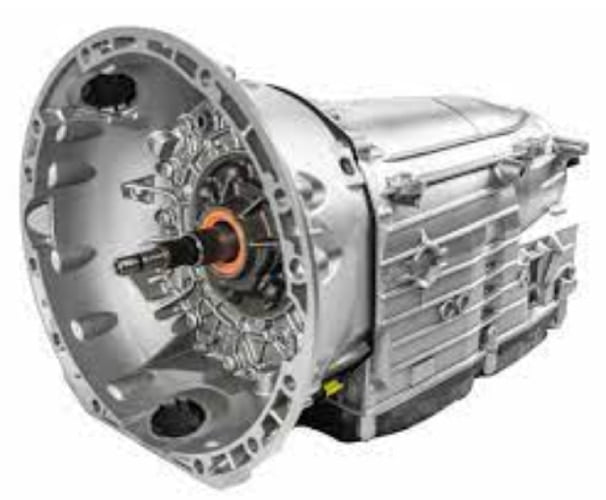
Transmission refers to the entire drivetrain, including gearbox, prop shafts, differential, and final drive. It is indirectly coupled to the engine’s shaft through a clutch in manual cars or torque converter in automatic vehicles.
A transmission consists of five or six gear sets and a series of gear trains that control the power delivered to the wheels. That is done regardless of how fast the engine spins. In other words, transmission ensures that your engine runs at its maximum efficiency. At the same time, the right amount of power is delivered to the wheels.
Read more: Transmission leak: Symptoms, causes and repair guide
Bad Torque Converter Vs. Bad Transmission Symptoms Comparison Chart
Here is a summary chart highlighting the differences in symptoms of a bad torque converter and faulty transmission system:
| Symptoms | Bad Torque Converter | Bad Transmission |
|---|---|---|
| Loss of acceleration | ✓ | |
| Delay going into gear | ✓ | |
| Weird smell | ✓ | |
| Slipping between gears | ✓ | |
| No vehicle movement in gear | ✓ | |
| The vehicle won’t shift at all | ✓ | |
| Transmission fluid leak | ✓ | |
| Filthy fluid | ✓ | |
| Some gears work | ✓ | |
| Transmission is overheating | ✓ |
Bad Torque Converter Vs. Bad Transmission: Symptoms And Causes Explained
Bad Torque Converter Symptoms
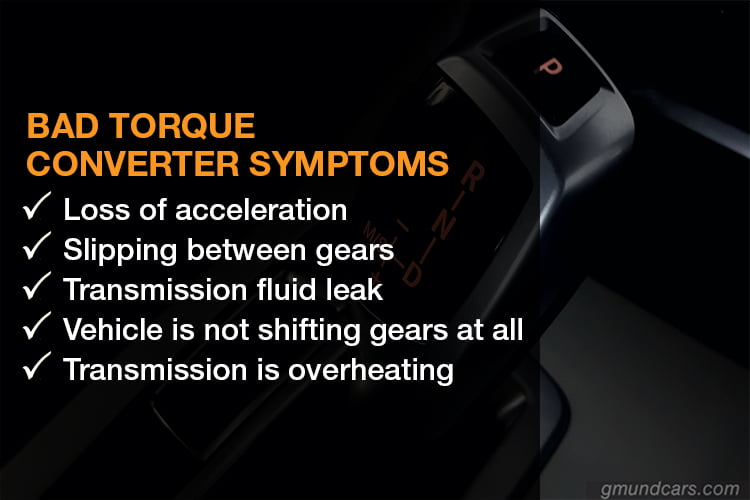
Let us begin our discussion with symptoms of a bad torque converter and its causes. This information will help you know any issues with this delicate machinery on time for timely repairs.
Loss of acceleration
If you have been driving your car for a while, you know how it responds when you step on the accelerator pedal. When the torque converter has a problem, you will start experiencing sluggishness. The vehicle will take a longer time to achieve top speed than it used to be. That problem is most likely resulting from a bad torque converter.
Slipping between gears:
Unlike manual transmission cars, automatic cars transition smoothly between gears. However, you can still notice when the vehicle is making shifts if you reduce or increase speed quickly by stepping on the brake pedal or accelerator. If you feel that the gears are not engaging or the car keeps on changing gear ratios, there is a high chance that your torque converter is the victim.
Transmission fluid leak
A torque converter relies on the transmission fluid to transfer power from the engine’s shafts to the transmission. The transmission fluid is sealed within this complex machinery. However, it is prone to wear and tear. That can lead to leakages over time. Undoubtedly, a leaking torque converter is bad. It is among the first warning signs that your car needs a checkup. Leaking transmission fluid can lead to more problems if not fixed on time.
Vehicle is not shifting gears at all:
Apart from slipping between gears, a torque converter may be jammed. If you cannot change between drive and reverse gears, it is a clear sign that your torque converter has a problem. Call a mechanic or a tow service to pull the car to a nearby auto repair shop for further diagnosis.
Transmission is overheating:
A sensitive temperature sensor constantly monitors your transmission system. You will get a warning light on the dashboard if there is overheating, which you should attend to immediately. Do not continue to drive your vehicle with a high transmission temperature light on to prevent further damages to the system. The cause can be a bad torque converter, which your transmission mechanic should tell you.
Bad Torque Converter Causes
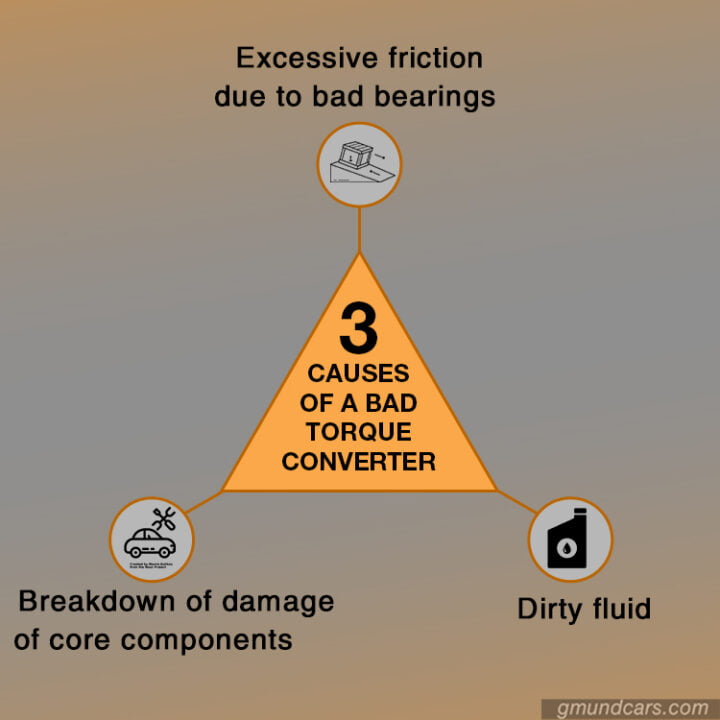
Excessive friction due to bad bearings:
Components of the torque converter are coupled with rubber bearings to reduce friction. With time, bearings can wear off and break down. When that happens, two or more parts will rub against each other. You may hear a cracking sound when you start the engine. Do not take it lightly because the sound is from parts that grind each other. Instead, take your vehicle to a mechanic as soon as possible.
Dirty fluid:
As mentioned, your torque converter depends on the incompressible transmission fluid. When the transmission fluid is contaminated or is not the right type recommended for it, it may cause problems. Before you pour any transmission fluid into the transmission fluid reservoir, ensure you have the right one. You may pay for costly repairs when the fluid finally damages your torque converter if you ignore this advice.
Breakdown of damage of core components:
A torque converter is a piece of complex and delicate machinery consisting of many parts. If any of its constituents fails, its functionality will be compromised. Damage to a torque converter usually results in the leakage of transmission fluid. Examine the area around it for any signs to confirm your worst fears. Seal any leaky spots or replace damaged components.
Bad Transmission Symptoms
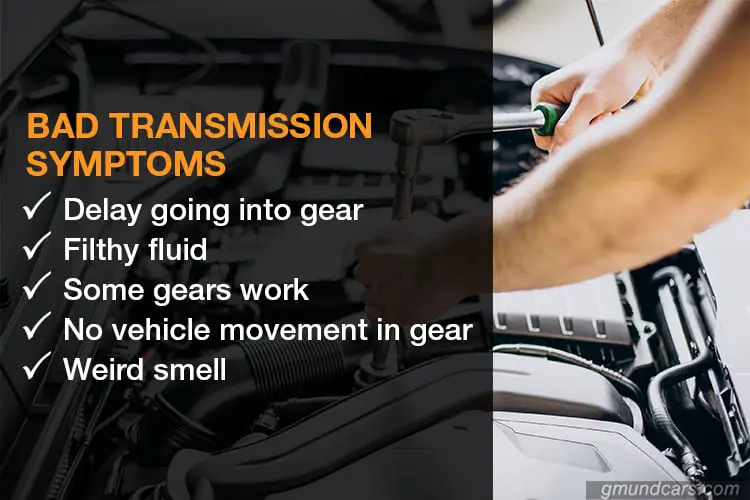
Transmission-related problems are usually expensive. It is the last thing that many drivers or car owners want to hear when they take their vehicles to a mechanic. This unit has more components and is more likely to develop faults than the torque converter. Fortunately, you can tell before it goes wrong because of the following symptoms:
Delay going into gear:
There should be a second between the time you select the drive or reverse gear and then listen for the sound from the gearbox to confirm your action. If there is a significant delay, your transmission system is faulty. In severe cases, you may fail to hear the selected gear engaging. In that case, do not step on the accelerator pedal, as you may cause more damage. Just call your automotive mechanic for help.
Filthy fluid:
Transmission fluid can give you the state of your transmission system. A newly bought transmission fluid has a translucent dark red color, but it turns darker over time. Observing the color changes of your transmission system will tell you if there is a problem in the system or not. Excessive friction will cause fast darkening of the fluid.
Some gears work:
Gears may fail to engage if the vehicle has entered into a limp mode or an issue with the transmission system. A limp mode results from different causes, which are out of the scope of this article. But if you cannot shift to some gears, your transmission system is the cause.
No vehicle movement in gear:
A damaged torque converter is also a possible cause of this problem, but a faulty transmission is a likely cause. If there is low transmission fluid, the vehicle will not move because the transmission system cannot dispatch power to the wheels.
Weird smell:
Any transmission system is lubricated by a specific fluid. Gears spin more smoothly in this fluid because of negligible friction. But with time, as the vehicle hits higher mileages, the transmission fluid may start to leak. It can also burn inside the transmission, releasing a weird odor. Your role as a driver is to inspect to ascertain that the smell is, indeed, coming from the transmission system.
Read more: Low transmission fluid: Symptoms, causes, and repair guide
Bad Transmission Causes
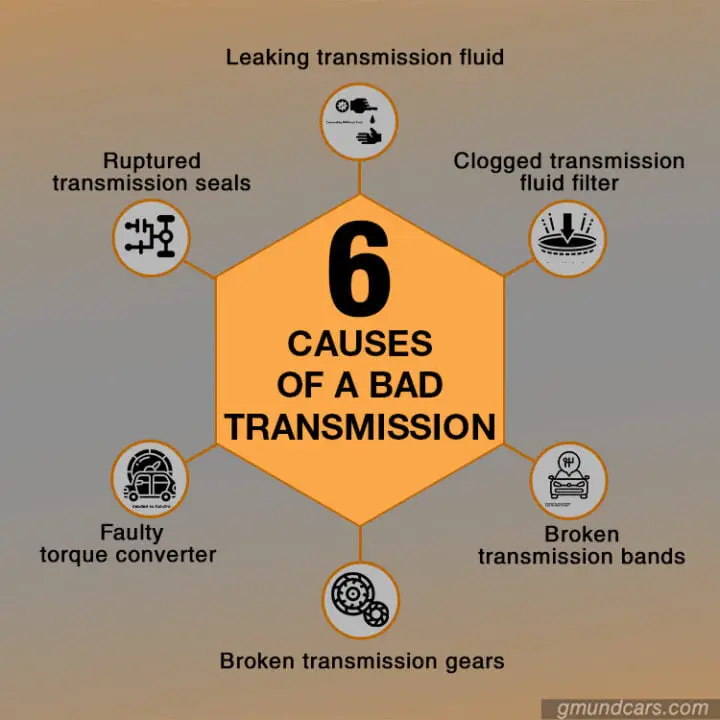
Leaking transmission fluid:
Transmission systems work with a specific amount of transmission fluid. Leakages can lead to low fluid in the transmission system, reducing the hydraulic pressure for shifting gears. The transmission fluid can also degrade with age, losing its ability to lubricate or cool the system. You will start experiencing slipping before the transmission fails. To avoid this situation, check for leakages regularly and take necessary actions.
Clogged transmission fluid filter:
The quality of transmission fluid should be maintained. It should also flow through the system without any obstructions. However, that is not the case with a clogged filter. A clogged filter performs poorly and also resists its flow. This problem will also cause slipping, and gears may fail to engage.
Broken transmission bands:
An automatic transmission has a set of rubber bands that harmonize the gear operation. These should be fixed. When they are too tight, they become prone to wear and tear, leading to early failure. And when they are loose, gears will slip and even fail to engage.
Broken transmission gears:
Transmission gears are made of hard metals that cannot easily break. But when they eventually snap, they hinder the operation of the system. Shifting gears become a problem, and the entire transmission system fails.
Faulty torque converter:
Torque converter transfers power from the engine to the transmission system through a pressurized transmission fluid. If damaged, it fails to deliver transmission fluid under the recommended pressure. That will cause gears to slip and get out of phase.
Ruptured transmission seals:
Broken, ruptured, or faulty seals allow transmission fluid to leak. When the remaining volume is not enough to lubricate and cool gears, friction sets in to cause damages. That leads to transmission failure if not attended to on time.
Read more: Transmission flush: Never do it before reading this guide
Key Facts And Advice For A Bad Torque Converter And A Bad Transmission
- Bad transmission repair or replacement cost is higher than a bad torque converter.
- Most symptoms of a bad converter are the same as those of a bad transmission, which can be confusing.
- Before replacing or changing your transmission, check if the torque converter is the victim.
- A bad converter can damage your transmission. You should, therefore, act speedily to repair it before it results in costly damages.
FAQs
1. Can a bad torque converter damage a transmission?
Yes. Torque converter pumps pressurized fluid through the transmission. If it is faulty, the transmission system will be getting less than enough fluid for its operations. Gears will start slipping, and friction becomes more.
2. Is it necessary to replace or rebuild the whole transmission when my torque converter is bad?
No. You don’t have to replace the entire transmission if you identify the faulty torque converter on time. Just repair or replace your torque converter only, and you should be ready to get back to the road.
3. Should I replace the torque converter when rebuilding the transmission?
Yes. The torque converter can’t be cleaned or flushed out and must be included in a transmission rebuild. You, therefore, need a new one to complete your transmission rebuild.
4. Will a torque converter cause a transmission not to shift?
Yes. A damaged torque converter causes gear shifting delays and slipping. That reason is that the engine power is not efficiently converted to hydraulic pressure by the torque converter, leading to less engine power in the transmission to shift gear.
5. Does the transmission fill the torque converter?
Yes. Starting the engine will make the transmission system circulate the fluid and fill the converter automatically.
The Verdict
Symptoms of a bad torque converter and bad transmission are almost the same and can be confusing. If you are aware of the difference, you can save yourself from the costly transmission repairs or replacements. You don’t have to replace the transmission if the torque converter is the culprit. Just handle it as an independent unit.